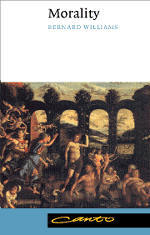Book contents
- Frontmatter
- Contents
- Preface to the Canto edition
- Preface
- MORALITY AN INTRODUCTION TO ETHICS
- The amoralist
- Subjectivism: First thoughts
- Interlude: Relativism
- Subjectivism: Further thoughts
- ‘Good’
- Goodness and roles
- Moral standards and the distinguishing mark of a man
- God, morality, and prudence
- What is morality about?
- Utilitarianism
Preface to the Canto edition
Published online by Cambridge University Press: 05 April 2013
- Frontmatter
- Contents
- Preface to the Canto edition
- Preface
- MORALITY AN INTRODUCTION TO ETHICS
- The amoralist
- Subjectivism: First thoughts
- Interlude: Relativism
- Subjectivism: Further thoughts
- ‘Good’
- Goodness and roles
- Moral standards and the distinguishing mark of a man
- God, morality, and prudence
- What is morality about?
- Utilitarianism
Summary
THIS text was originally intended to be part of a larger book, which was to consist of several novella-length pieces by different writers, forming collectively a substantial introduction to philosophy. When the editor, Arthur Danto, invited me to write the section on moral philosophy, he made it clear that while we were encouraged to write in an introductory way, we were not being asked to write merely a survey, but rather to pursue the interests and questions that each found most interesting or fruitful. The publishers in the end decided not to put out the big book (which, granted who they were, some of us had inevitably called ‘Harper's Bazaar’), and published each section separately.
At least one of those books (Richard Wollheim's Art and Its Objects) has grown in later life, acquiring new sections in further editions. This one, on the other hand, remains as it was. The main reason for this is that I have subsequently written other books and papers on some of the same subjects, and could see no point in loading this text with intrusive (and probably misleading) references to that later work. In the case of one topic, utilitarianism, this would have been particularly inappropriate, since in what I wrote later I tried to take account of what I had written here, and to develop rather different points; the relevant chapter here perhaps summarizes the central problem, as I see it, of the utilitarian project more compactly than I have done elsewhere.
- Type
- Chapter
- Information
- MoralityAn Introduction to Ethics, pp. xi - xviPublisher: Cambridge University PressPrint publication year: 1993



